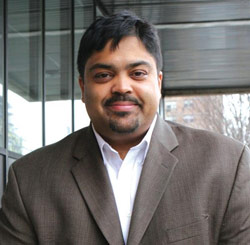 By Deepmalya Ghosh, LCSW-R; Director of Youth Development Programs, The Child Center of NY
By Deepmalya Ghosh, LCSW-R; Director of Youth Development Programs, The Child Center of NY
Brad Lupien is an idealist and an entrepreneur in the field of youth development. In his world, every young person would have an Individualized-Education Plan (better known as an IEP). He thinks that we need to find cost effective ways to deliver services with dollars invested, whether from the public or private sector. With the zeal of Robin Hood, he believes that there can be a symbiosis between the non-profit and the for-profit world and challenges executives to see this. I found the dialogue on this episode of Please Speak Freely to be passionate, inspiring and a good reminder of how important it is to think, “out of the box.”
I thought I heard two distinctly different episodes of Please Speak Freely, in this episode, as two major topics were touched upon (and I admit enjoying both!) The first episode, I would call: Youth worker vs. Credentialed Social Worker and the second, Social Service Business Models. While I love both of these topics, I’ve only responded to the first of the two episodes…
As mentioned, Lupien works toward the ideal of seeking an IEP for every young person! An IEP for every young person! And, really, WHY NOT? This is something that we should all aspire toward as providers in human service. Social work practitioners, for years, have been challenged with documentation and often see the need to keep notes as being part of, “the bureaucracy.” But the framework of good and professional work is in being able to conceptualize efforts on paper and the best social workers are also the best note keepers. An adjusted IEP (of some kind) would simply uplift the game of youth work, especially if all youth workers were made accountable to keep notes. A well-designed document can be the best educational tool for any worker.
Perhaps, Lupien did not intend that the IEP’s be done by a “professional,” and my assumption is that again we’re talking about a social worker or guidance counselor completing such. Here is where I would push farther…in order to make this dream come true, policy makers and funders and social workers/guidance counselors need to recognize the cost-effective strategy of using youth workers as the means of bringing this home. In the education world, IEP’s are only reserved for those that tend to be in the special education system, but really…if we consider this carefully, it just might be a better way to go, to teach youth developers to work within normative organizational structures, to create an individual plans for the thousands that we serve? We’d essentially be training differing levels of staff in good casework practice, in developing habits of highly effective people and in joint goal planning!
I guess that this resonates with me, because this topic relates to my own career as graduate-level, credentialed and licensed social worker. In my first years in the field of human service, I worked as a clinician providing psychotherapy to youth involved in the foster-care system and then after initial success in this area, was moved into a management role focused on the opening of a Beacon Center in NYC. At this juncture in my career, I was forced to see many limitations in understanding life through a clinical eye. Transitioning from a, ‘symptom-driven referral-only culture,” to an asset-based structure that engaged young people with services, opportunities and supports led me down a different path that ultimately challenged my core understanding of an individual’s capacity to change, particularly those that we serve and under what conditions folks are inspired to change.
In youth work, with a point of entry coming via a different route, peers and mentors develop trust more easily and readily than some of the best social workers…whether credentialed therapists or not. In fact, within my first year, neighborhood youth workers…primarily college students from the local neighborhood, who were on my staff often playfully challenged me to explain why I relied so heavily on social work staff to engage our more disengaged youth participants. They challenged me to see how deeply they, themselves, had engaged even the hardest to reach and done so with remarkable ease. Essentially, youth workers are much more able to engage a young person, “where they are at,” because they’ve already been there and often pretty recently.
Lupien suggests that youth workers in afterschool programs can act as “support staff,” to the social workers and guidance counselors, who are too often overburdened with enormous caseloads. I believe that, although perhaps unintended, this small comment does not fully recognize the power and potential of youth work & mentoring. He does go on to touch upon the important training regimen he’s implemented in Champions (now ARC) programming, which my dream can’t be realized without. This is a direction that we’ve all reached in the afterschool field, as the potential for youth work to address gaps in social-emotional learning has come to the forefront. A steady professionalization of the field has taken place through identification of core competencies and through the public’s steady dependence on afterschool programs.
The ideal that Lupien dreams of and that I join him in…having every young person involved in afterschool programs, with an IEP is sadly brilliant in that it is so obvious. And while I am a strong proponent for the role of the youth worker, I do not want to marginalize the equal importance of credentialed social work staff, who can specialize in digging deeper and in more readily getting at root-causes with their clients. I wonder if, however, the greater ideal is to see that guidance counselors and credentialed social workers can be the “support system,” for the youth worker…who far more often, is the lifeline for our most disengaged…or even our most successful and engaged